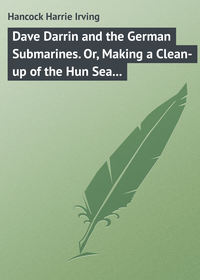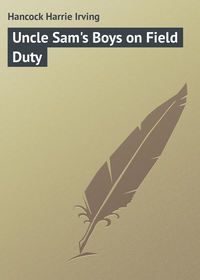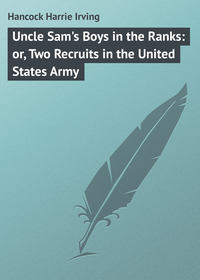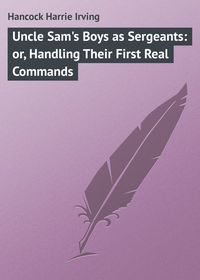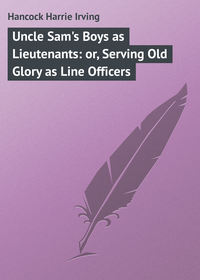 полная версия
полная версияThe Motor Boat Club at the Golden Gate: or, A Thrilling Capture in the Great Fog
Both motor boat boys sighed their supreme contentment as they dropped into arm-chairs facing each other. It was now so dark that Tom switched on the electric lights.
"How are the engines, Joe?" asked Tom, dropping into his old, friendly manner.
"Ready to start at a second's notice. And Jed's on duty there, waiting for the word."
"Gasoline?"
"Tanks bulging with it. Tom, this is a beautifully appointed boat below, and every store of every description is in place."
"That's the kind of a man I'm pretty sure Mr. Baldwin is," nodded Halstead.
Joe surveyed a row of speaking tubes that hung against the forward wall of the captain's room. He picked out one labeled "engine-room," pressing the button beneath it.
"Hello, sir," came the quick response, in Jed Prentiss's unmistakable tones.
"Hello, Mr. Prentiss," Joe returned. "How do you like it down there, on duty?"
"It's perfect!" responded Jed, almost dreamily. "Everything here but my own personal steward. I ain't sure but what he'll blow in, in a minute, and ask me what I'll have for dinner."
"Tell him we're scheduled to start at seven," suggested Halstead.
"I can start in seven seconds, if I'm asked to," promised Prentiss. "Anyway, I can have the propellers turning fast before you can get the anchor up. Crackey! I forgot that I have to supply even the power for hoisting anchor."
Twenty minutes later the two chums, who had begun their career by patching up an old steam launch down at the mouth of the Kennebec River, in Maine, were seated at table in the captain's cabin, doing justice to a meal that was but little short of sumptuous.
The chief steward himself, a man named Parkinson, served the young captain and chief engineer. He hovered about, as attentive as any hotel waiter or private butler could have been.
It was the second steward, however, who came in with the dessert for the two chief officers of the "Panther."
"What has become of the other steward?" inquired the young captain.
"Time for him, sir, to put on the finishing touches in the dining saloon," replied Collins, the second steward, who served also the junior officers and the crew.
"If we eat like this at every meal, Joe," sighed Halstead, contentedly, when the second steward had removed the last of the things, "we'll have to devote all the rest of the time to exercising off extra flesh. Let's get out on deck."
"All right. But I mean to be in the engine-room when the start is made."
At the side gangway the chums stepped quickly past, to make way for half a dozen men who were coming up over the side, while Mr. Costigan stood respectfully by to receive them. They were guests of the owner just coming on board for the night's cruise. One of these newcomers went directly to Mr. Baldwin's suite.
"Owner's compliments, sir," called Parkinson, softly, as he came hurrying after the young sailing master. "Mr. Baldwin wishes to see Captain Halstead on the jump, sir."
The call had come for the brisk beginning of the strangest duties in which young Halstead had ever been employed.
CHAPTER IV
HALSTEAD IS LET INTO A SECRET
"Captain Halstead, my friend, Mr. Jason Ross," announced Mr. Baldwin, crisply, as soon as the young skipper had closed the owner's door behind him.
Mr. Ross was a man of forty-five, and looked like a man who might be of much importance in the financial world. Yet he was presented to Halstead, for on a yacht the captain is considered next in importance to the owner.
Tom modestly greeted Mr. Ross.
"Sit down, Captain," snapped out the owner, though not unkindly. "Now, I've got to take you into my confidence a bit. Delavan's word for you makes me feel that I can safely do it."
Tom had only time to nod ere Mr. Baldwin went on, crisply:
"My guests are on board, with one exception. In a way, the exception is the most important one of us all. He isn't so very important in himself, but Gaston Giddings, though a very weak, foolish young man, happened to succeed his father in the principal control and presidency of the Sheepmen's National Bank. Young Giddings and the funds his bank can supply are of the utmost importance to my associates and myself in some big enterprises we are putting through. Do I make myself clear?"
"Wholly so, sir," Tom answered, quietly.
"Now, Giddings, besides being several kinds of plain and ornamental fool – no, I won't quite say that, but this weak young man has one fearful fault for the head of a bank – "
Joseph Baldwin paused in his rapid speech. He looked sharply at Mr. Ross an instant, then continued:
"Oh, well, Frank Delavan told me I could trust you and Dawson with anything from my yacht to my reputation. You understand that what I'm telling you, Captain, is absolutely confidential?"
"Of course, sir," responded Tom, quietly.
"Well, then, within the last three months young Giddings has, in some way we can't understand, fallen a victim to the opium habit. The young man is all but totally wrecked by the vile drug. How, or why, he started, none of us can understand. You see, a good many of us older men, who were fast friends of his father, have tried to stand by the young man. Two of to-night's party are directors in the Sheepmen's Bank. We've tried to get the bank's funds placed in interests that we control, so that young Giddings couldn't go very far wrong, by not having enough money left in his charge to wreck the bank. You follow me?"
"I – I think so, Mr. Baldwin."
"Truth to tell," pursued the owner, "I had planned – my friends on board with me – to go out ostensibly for one night, but really to be gone for several days. One of our friends is a specialist in the opium habit – Dr. Gray. We had hoped, on this trip, to plan some financial enterprises that would use up, for the present, the dangerously large balance at the Sheepmen's Bank. At the same time we were going to try to force young Giddings to agree to heroic medical treatment in order to overcome his fearful vice."
Tom Halstead remained silent, but attentive.
"Now, at the last moment," pursued Mr. Baldwin, "we hear that Giddings was seen in a closed carriage, evidently headed for Chinatown, that vile Oriental section of San Francisco, where the opium vice flourishes at its worst. And in Chinatown a man can disappear so completely that his friends can't find him again in years. Giddings was to be here to-night, but he's in a Chinatown opium den instead. If we appeal to the police, it'll all be in the newspapers. There'll be a scandal that will disgrace Giddings forever, start a run on the Sheepmen's Bank, and – though this is the least of our worries – will delay for some time the pushing of the big financial game in which my friends and myself are interested. Now, we've got to find some way of getting at Giddings, and of bringing him on board without trouble or noise. I've told you this much, Captain Halstead, so that you'll understand the need of secrecy. If we can find Giddings, and get him out here, then we must bring him over the side and get him into his stateroom without his being seen by any of the crew on board, except, possibly, by one or two of your own comrades whom you think you can best trust."
"I can trust every one of 'em, sir," declared Captain Tom, promptly. "So will you, when you know them better."
"Then, Captain, before we make any move to find Giddings in his Chinatown hiding-place, and attempt to get him aboard this yacht, we must have all of the crew safely out of the way, save for your own personal friends among the officers."
"I can plan for the crew to go ashore," declared Tom Halstead. "I have only to state that you've decided to delay putting out to sea, and that you've been good enough to grant the men a night on shore at the theatre at your expense. That will take every one of them over the side. Do you want Mr. Costigan to go?"
"Why, I think Costigan is all right, but he isn't needed here, anyway, so he'd better go ashore also."
"Easily settled, then, Mr. Baldwin. I can send Mr. Costigan off in charge of the shore party. At what hour do you wish them all to return, sir?"
"Not a minute before midnight!"
"Very good, sir. I can tell Mr. Costigan that you've been called ashore, that you will dine there, and that you are very glad of this opportunity to give the older members of the crew a chance to enjoy themselves ashore."
"Excellent, indeed!" cried Mr. Baldwin, in a low tone. "What do you say, Ross?"
"If Captain Halstead can vouch so heartily for the silence and discretion of his own friends, then the plan ought to clear the decks so that we can get Giddings aboard – if we find him – without any comment or scandal at all," agreed Jason Ross.
Joseph Baldwin employed himself stripping a few banknotes from a roll that he drew from a trousers pocket.
"Give this money to Mr. Costigan, Captain, and tell him to see to it that the men have a good time on shore – though no drunkenness! And you, Captain Halstead, I trust to see to it that none but your own friends remain aboard."
Ten minutes later Captain Tom returned to the owner's suite to report that Third Officer Costigan and the crew, including the stewards and cooks, had gone ashore in the tender, Jeff Randolph running the boat in.
"How soon will Randolph be back?" asked Mr. Baldwin.
"Within ten minutes, sir."
"Then I shall want him to put Mr. Ross and myself ashore. We two must take up the seemingly impossible task of locating young Giddings in the heart of Chinatown's slums, and bring him here by force, yet without noise. Once we get him on board, and below, we can keep the young man quiet until morning, when we'll be well out on the ocean. Dr. Gray will attend to that."
"Are your friends going to remain on board, without dinner?" asked Halstead.
"No; they can go ashore and get dinner at a restaurant, returning presently. Mr. Randolph can keep the tender at the landing stage until they return. Then, as soon as he has brought our other friends aboard, Mr. Randolph can return for Ross and myself, when we get back. But Mr. Randolph must not let Costigan or the crew get aboard until after we've returned."
"I'll make his instructions clear on that point," nodded Tom.
"That is all, then. Let me know when the tender returns."
"Hold on, a moment, Baldwin," interposed Mr. Ross.
"Well?"
"Baldwin, neither of us is in what might be called the pink of condition, and young Giddings may put up a fight in his half-crazed way. Don't we need a little real brawn with us?"
"Taking Captain Halstead with us, do you mean?"
"That was the idea that had come into my head," nodded Mr. Ross.
"Yes; it would be an excellent idea. Captain, you will go with us. Leave your first officer in command here until we return."
"Very good, sir."
Tom Halstead saluted, then withdrew. He gave his orders quickly, not deeming it necessary to mention any phase of the story of young Gaston Giddings to his comrades of the Motor Boat Club.
As soon as the launch was alongside Tom hastened to inform Mr. Baldwin. The entire party thereupon came out on deck, gathering at the side gangway. They speedily embarked in the tender, in which Jeff sat where he could handle both engine and steering gear.
"Your instructions are clear, Mr. Perkins?" called Tom Halstead, softly, from the launch.
"Quite clear, sir," Ab replied. "The instructions will be followed to the letter."
"Shove off, then," Tom commanded. "To the landing stage, Mr. Randolph."
It would have been almost laughable, to anyone who had witnessed the frolicsome motor boat boys going through their hazing affair of the forenoon, had he now been at hand to hear them using the stately "mister" and "sir" with all the gravity of naval officers.
Jeff speedily had the party ashore.
Twenty minutes later a closed cab rolled slowly in at one corner of gayly-lighted, malodorous Chinatown. The vehicle contained Messrs. Baldwin and Ross and young Captain Tom Halstead. In this poisonous atmosphere they sought a young human wreck, Gaston Giddings.
CHAPTER V
A HUNT IN THE UNDER-WORLD
During the ride from the water front Captain Tom Halstead had sat on the front seat of the cab, quiet and reserved.
Now, as they entered the outer confines of Chinatown, Halstead leaned slightly forward, peering out at the shops and at the queer Oriental jumble, mixed here and there with white people, that thronged the narrow sidewalks.
"Are you headed for any particular place, sir?" queried the young skipper, after a few moments.
"No," admitted Mr. Baldwin. "I know nothing of Chinatown. We must drive through, first of all, at a venture. Presently an idea may come to us. Whatever we do, our plans must soon be formed. If I dared speak to a police officer – but the risk is too great."
"There's a restaurant," murmured the boy, suddenly. "It looks like a big and clean place. Why don't you and Mr. Ross slip in there, have some tea or something, and let me prowl about in these queer, crooked streets for a few minutes? Chinatown is only a few blocks in extent, I understand. I may be able to learn something that way, unless you have a better plan, sir."
"I am afraid you'll run into danger, alone in this barbarous crowd," objected Mr. Baldwin.
"I'm not in the least afraid," smiled Tom, confidently. "Two prosperous looking men like you might attract attention, but, as for me, the people hereabouts will think only that I'm some young sailor ashore for a lark. Shall I stop the cab, sir?"
"Yes," agreed Joseph Baldwin, though he spoke doubtfully.
Tom's hand shot up at once, grabbing the check string. The driver pulled up his horses, then came to the door, opening it.
"This will be as good a place for you to remain, driver, as anywhere," said Halstead, as he stepped out. Then he turned, waiting for Messrs. Baldwin and Ross to alight.
"Shall I find you in that restaurant, sir?" the young skipper inquired.
"Yes; but don't be too long away, Halstead, or we shall be more uneasy than ever."
"Trust a sailor to take care of himself in any crowd, sir," laughed Tom Halstead, jauntily. With that he stepped off, at a more rolling gait than he usually employed on shore.
The young motor boat captain carried in his mind a good personal description of Gaston Giddings. He had secured this from Mr. Baldwin before leaving the yacht.
"Ugh! The smell here is worse than in New York's Chinatown," Tom told himself, disgustedly.
From upper windows of some of the buildings that lined the narrow, dirty streets came the squawkings of Chinese fiddles and other discordant "musical" instruments of a wholly Oriental type. There seemed to be two or three joss-houses, or temples, in every short block. On the street floors, however, stores offering all kinds of Chinese merchandise were most common. Tom suspected that the gambling places and opium joints lay in the rear of these stores.
"Want a guide to Chinatown? Show ye everything, boss, for two dollars. Show ye every real sight in Chinatown," appealed a seedy, dirty, young white man who now held Tom by one sleeve.
"Anything really worth seeing?" asked Halstead, smilingly.
"Oh, everything worth seeing," responded the seedy guide, with a wide wave of one arm. "Best two dollars' worth you ever had. Most curious sights you ever saw in any part of the world. Sailor, ain't ye?"
"Yes."
"Sailors are my specialty," declared the seedy guide, grimly. "Come, ye'd better haul up the two dollars and let me take you about."
"What about opium joints, for instance?" asked Tom Halstead, speaking as though he had not enthused much as yet.
"I know 'em all," asserted the seedy guide, eagerly. "Want to smoke the opium pipe?"
"Can't say," replied Tom, vaguely. "Yet, if I do go around with you, you've got to take me to the really swell opium places."
"Oh, I can do it – better'n any other guide in Chinatown," promised the fellow, quickly. "Come, just hand over the two dollars, and see what I can show you."
With a great pretense of reluctance Captain Tom produced four half dollars, which he handed to the guide.
"Remember, now," he said, "I want what you might call the aristocratic places."
"If ye ain't satisfied," promised the guide, glibly, "then ye'll get your money back."
"Go ahead, then, but mind what I told you."
Through dark alleyways, or through stores into rear apartments, Halstead followed his conductor. In rapid succession he passed in and out of half a dozen opium joints. One was as much like another as two kernels of wheat resemble each other.
In each place there was the same outer room, then the same bunk-room, an apartment fitted up with bunks at the sides. It was in these rooms that the smoking was done. The intending smoker stretched himself out in a bunk, while a Chinese attendant brought lamp and kit. A tiny ball of opium was quickly lighted – "cooked" – at the lamp's flame. Then this glowing pellet of opium was thrust into the bowl of an opium pipe, and the latter handed to the smoker in the bunk. The smoker consumed his pellet after two or three whiffs. After smoking three or four pipes, most of the smokers succumbed, falling back in a torpid sleep.
The air was heavy, disgusting in these places. Degraded white men and women were occasionally to be seen, though most of the smokers were Orientals, generally Chinese.
Heart-sick and dizzy, Tom Halstead still kept on, though, whenever he reached outer air, he took pains to inflate his lungs several times before again entering one of the wretched, squalid "joints."
Off the bunk-rooms several of these dens had "private" sleeping apartments, for white smokers who desired more privacy. Wherever he noted doors to such private rooms Tom Halstead thrust them open, glancing inside. Nor was his conduct resented. The opium smokers were too far gone to show or feel anger.
"You haven't shown me any very swell places yet," protested the young skipper, after leaving the seventh place.
The guide, a thin, undersized, slovenly man in his early thirties, turned to look the motor boat boy over keenly.
Tom noticed that the fellow's eyes had a look in them much like the look in the eyes of several of the smokers they had just seen.
"This fellow is an opium-user himself," decided Tom Halstead.
"Say, young feller," remarked the guide, in a cautious undertone, "you're looking for someone."
"Perhaps I am," the young skipper half admitted.
"Who is he?"
"No matter. But do you know any of the men who come here to Chinatown often to use the pipe?"
"Say, if there's any white hop-fiend that I don't know, then he's a brand-new one," rejoined the guide.
"Do you know a young man of twenty-four or five, about five-eight tall, dark, slim, rather fine-looking, smooth faced and with a slight scar under his right ear?"
"I guess that must be young Doc Gaston," whispered the guide.
Gaston? That was Giddings's first name. Tom Halstead started, though he strove to conceal his excitement.
"Where does Doc Gaston go?" he demanded.
"What'll you pay to find out?" insisted the guide, cunningly.
"Ten dollars."
"Make it fifty, and I'll do it for you."
Tom, however, stuck to his original price, though three or four minutes were lost in haggling.
"Ten dollars is the highest price," Tom declared, flatly. "That pays you for standing by me until I get Doc Gaston – if he's the one I'm looking for – outside of Chinatown."
"Well, gimme the money now, then," demanded the guide.
"Oh, no," retorted the young skipper, tartly. "You get the money after we're through and on the edge of Chinatown in a cab. Now, don't haggle any more, or I'll drop the matter altogether. Are you going to take my offer, or not?"
"Say, you'll sure pay the ten, will ye?" whined the fellow.
"As sure as there's a sky above us."
"Then come along."
"Where's the place?" questioned Tom Halstead.
"Around the next corner."
"Do you know where Yum Kee's restaurant is?"
"O' course. They call Yum Kee the Chinatown Delmonico."
"Lead me back there, then, and we'll get the carriage."
Tom Halstead had been around so many corners in this crowded, complex quarter of San Francisco that he had lost his bearings. The guide, however, piloted him back to the waiting cab within two minutes.
First of all, however, the young skipper peered in at the restaurant. Messrs. Baldwin and Ross were at one of the rear tables, eating.
"Tell the driver where to go, now, and we'll make the start," Tom instructed the guide. Soon afterwards they alighted before a brightly-lighted Chinese grocery store. Besides the proprietor, there were three or four clerks and a dozen yellow-skinned, pig-tailed customers in the place. The guide, with an air of being at home here, led the way straight back, pushing ajar a door at the rear. The instant they entered this rear compartment the sickening odor of sizzling opium greeted Captain Tom's nostrils. This proved to be the inevitable outer room, but the guide led into the adjoining bunk-room. In this latter apartment were half a dozen doors.
"Just look through 'em," whispered the guide. "Don't talk to me none. Remember, if there's a row here, I've got to make up a yarn that will square things for me."
Two of the private rooms into which Halstead boldly intruded proved to be empty.
In the third room a weazened little old Chinaman crouched over a lamp and a tray holding an outfit. He was preparing to remove these things. In the bunk, sprawled out, with glassy eyes, was a young man whom Tom Halstead recognized in a flash – weak, vice-ridden Gaston Giddings!
CHAPTER VI
FACING THE YELLOW BARRIER
"Maybe what you likee here?" demanded the little old Chinaman, looking up with a snarl.
"Looking around," retorted Tom, grimly.
"Allee same —git!"
The guide had approached, taking a swift, shifty look in at the bunk.
"That's Doc Gaston, isn't it?" whispered Tom, over his shoulder.
"Don't ye know him?" queried the guide, suspiciously.
"He looks strange, with that glassy look in his eyes."
"That's Doc Gaston, all right. 'Least, that's what he calls himself in Chinatown."
"You allee same git – chop-chop," snarled the Chinaman, savagely. He had put the smoking outfit on the floor once more, and now pushed against the motor boat boy with both hands, trying to force him from the room. Tom, however, coolly and gravely picked the short Chinaman up off his feet, wheeled and put him down again on the floor of the bunkroom beyond.
"Now, shove off!" ordered Halstead, half gruffly. "Don't bother me again."
After flashing an ugly look at the motor boat boy, the Chinaman fled in the direction of the store.
"Now, whatcher going to do?" demanded the guide, nervously.
"If I can't get young Gaston to walking on his own feet, then I'm going to pick him up in my arms and carry him out to the carriage," answered Tom Halstead, firmly.
"Smoking joss-house!" gasped the guide. "D'ye know what'll happen? There'll be a house-full of them chinks down on us! Hatchet men – gun men – say, young feller, dontcher know that these here hop-joints are protected by the highbinders?"
Tom Halstead had heard of the Chinese highbinders in New York. He knew of them as a desperate crowd of yellow-skinned thugs. The guide's own terror was too real to be feigned.
"If you're afraid of this kind of a job, what did you come here for?" asked the young skipper, quickly, gruffly.
"Why, I thought ye was goin' to try to coax the young Doc out. But, say – taking him out by force – lemme get outer this on the jump!"
"No, you don't," roared Tom Halstead, with swift and quite unlooked-for energy. "Stand by, now!"
He gripped the guide by the arm, fairly forcing him over to the bunk in which the young opium smoker lay. Giddings, if it was really he, lay open-eyed, yet unheeding.
"Come, get up!" ordered the boy, reaching with both hands under the opium smoker's shoulders and raising him. "Out on your feet!"
A drowsy, unintelligible protest came from the stranger. But Tom fairly lifted him out onto his feet, then threw a strong, supporting arm about him.
"Now, walk! Come along!" ordered Halstead, briskly, taking hold of the young man with his other hand.


